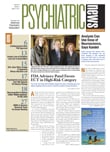When a patient describes hearing voices—or even the feeling of being anxious and depressed—can a clinician ever really "know" what that is like?
It's a question that has preoccupied psychiatrist John Strauss, M.D., throughout a 40-year career of research and clinical work with very severely mentally ill individuals: how to incorporate "subjective data"—the difficult-to-quantify information that a patient brings to the clinical setting about feelings, emotions, and states of mind.
"I have been interested in subjectivity, and in treating the person as well as the disease, in schizophrenia ever since my research and clinical work brought me into contact with the real people who have the disorder," he told Psychiatric News. "It has consistently raised for me a question that is disarmingly complicated and difficult to unravel—how do you combine an objective scientific approach with a subjective approach that really strives to know what it is like to be another person?"
In an era of symptom-driven diagnosis and "ultrashort" stays in the hospital, the effort to know the person behind the disease would seem to be forgotten. But in an editorial in the January Schizophrenia Bulletin, Strauss recounts his long interest in the area of subjective research and argues that it is vital to effective clinical work and to adequate research.
"The complete experience of hallucinated voices, for instance, often includes not only the voices themselves but also terrible anguish and terrifying inability to concentrate," he wrote. "But even such descriptors fall unnecessarily short of reflecting the data of the experience, thus leaving research, theory, and treatment with incomplete information. To represent adequately the subjective data, it is essential to recognize that besides the usual discursive knowledge and methods of traditional physical science, a second kind of knowledge and method is required to reflect the depth of human experience. . . . Only by attending seriously in our research, training, theory, and practice to the unique nature of subjective data is it possible to have a true human science for our field."
William Carpenter, M.D., editor of Schizophrenia Bulletin (and a long-time colleague of Strauss), called him a "hero to an element in our field that thinks we have neglected subjective experience." He said Strauss has committed not only his clinical work, but also his personal life to understanding and appreciating the inner world of the "other."
From an Outside Perspective
How is what Strauss is talking about different from good phenomenology? Are not the subjective data he seeks captured in such clinical descriptors as "impoverished emotional experience" "social anxiety," or "reduced motivation"?
Only partially and indirectly, Strauss said. "Phenomenology starts from an outsider's point of view," he says. "It still comes from an objective scientific tradition that seeks to reflect experience by describing it and analyzing it."
The "second kind of knowledge" Strauss believes is necessary to understand the inner world of the "other" is experiential. In his editorial he draws an analogy: when a work colleague of his was going through a divorce, he could understand intellectually the stress his friend was going through—up to a point.
"At one point, however, the work became overwhelming, and so I told him that I understood what he was going through and how difficult that must be, but he simply had to apply himself more to our project because it was getting dangerously behind schedule," he wrote. "A few years later, I was going through a divorce of my own, and although it was a ‘civilized’ process, I often felt totally overwhelmed by the degree to which it took me over, preoccupied me and all aspects of my life. I suddenly realized that I had previously had absolutely no idea of what my colleague must have been going through."
Getting Into the Mind of Another
Strauss said that this kind of experiential knowledge lies outside the realm of traditional, objective scientific inquiry. And the quest for it has led him to experiment with acting classes and with writing in French (in which Strauss is fluent) as a means of entering into the mind of another. "I'm not an actor, but the experience of trying to do it has been for me a new way of coming at the human experience and getting into the mind of another," he told Psychiatric News.
But how can an interest in the subjective experience of people with mental illness be meaningfully incorporated into contemporary psychiatry?
In his editorial, Strauss described leading creative writing programs for clinicians working with severely mentally ill individuals that allow participants to share their patients' subjective experiences in a clinically meaningful way. And he has conducted role-playing exercises with residents at Yale and elsewhere in which trainees play the part of a patient being queried about symptoms by a doctor; later Strauss takes the role of the patient and the trainee plays the doctor—but is required to simply listen to the patient talk, and only "ask the doctor questions later," Strauss said.
Audiotapes that simulate the experience of hearing random voices are another powerful tool, and Strauss recounted his own disorienting experience of listening to such a tape for a lengthy period and how the experience helped him appreciate better the inner life of a patient with psychosis.
"Some time later, when I was doing a repeat follow-along interview with a young man with schizophrenia who was in our study, he told me that, yes, he was hearing voices still, but he had decided to return to college nevertheless," he wrote. "My admiration for his courage was enormous, something I had never felt before in such an instance. Even though mine was the most tepid version of his experience, I had known of course the source of my voices and that I could turn them off at any time. The experience of listening to the tape had entirely changed my understanding of what he was going through."
